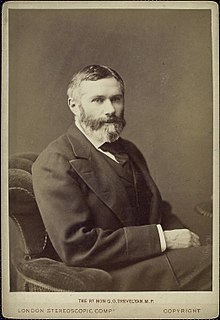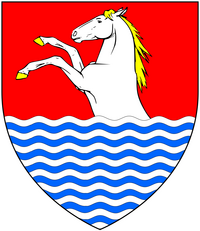Sir George Trevelyan, 2nd Baronet
George Trevelyan | |
|---|---|
 Sir George Trevelyan, Bt | |
| Chief Secretary for Ireland | |
| In office 9 May 1882 – 23 October 1884 | |
| Monarch | Victoria |
| Prime Minister | William Ewart Gladstone |
| Preceded by | Lord Frederick Cavendish |
| Succeeded by | Henry Campbell-Bannerman |
| Chancellor of the Duchy of Lancaster | |
| In office 29 October 1884 – 9 June 1885 | |
| Monarch | Victoria |
| Prime Minister | William Ewart Gladstone |
| Preceded by | John George Dodson |
| Succeeded by | Henry Chaplin |
| Secretary for Scotland | |
| In office 8 February 1886 – March 1886 | |
| Monarch | Queen Victoria |
| Prime Minister | William Ewart Gladstone |
| Preceded by | The Duke of Richmond |
| Succeeded by | The Earl of Dalhousie |
| In office 18 August 1892 – 21 June 1895 | |
| Monarch | Queen Victoria |
| Prime Minister | William Ewart Gladstone The Earl of Rosebery |
| Preceded by | The Marquess of Lothian |
| Succeeded by | The Lord Balfour of Burleigh |
| Personal details | |
| Born | 20 July 1838 Rothley Temple, Leicestershire |
| Died | 17 August 1928 (aged 90) Wallington, Northumberland |
| Nationality | British |
| Political party | Liberal |
| Spouse | Caroline Philips |
| Alma mater | Trinity College, Cambridge |

Sir George Otto Trevelyan, 2nd Baronet, OM, PC, FBA (20 July 1838 – 17 August 1928) was a British statesman and author. In a ministerial career stretching almost 30 years, he was most notably twice Secretary for Scotland under William Ewart Gladstone and the Earl of Rosebery. He broke with Gladstone over the 1886 Irish Home Rule Bill, but after modifications were made to the bill he re-joined the Liberal Party shortly afterwards. Also a writer and historian, Trevelyan wrote his novel The Competition Wallah in around 1864, and The Life and Letters of Lord Macaulay, his maternal uncle, in 1876.
Background and education
[edit]Trevelyan was born in Rothley Temple, Leicestershire, the only son of Sir Charles Trevelyan, 1st Baronet, and Hannah, daughter of Zachary Macaulay and sister of the historian Lord Macaulay. He was educated at Harrow[2] and Trinity College, Cambridge, where he was President of the Cambridge Union Society, and earned second place in the first class of the Classical Tripos in 1861.[2][3] That same year he wrote his Horace at the University of Athens, a topical drama in verse, parts of which are said to have offended William Whewell and lost Trevelyan a fellowship.[2] He was a Cambridge Apostle.
Political career
[edit]
In 1862 Trevelyan went out as a civil servant to India, where he spent several years.[2] In 1865 he was elected Liberal Member of Parliament (MP) for Tynemouth and North Shields.[2][4] At the general election of 1868 he was returned for the Hawick Burghs, which he continued to represent until 1886.[2][5] When the first Gladstone ministry was formed in December 1868, Trevelyan was appointed Civil Lord of the Admiralty, but resigned in July 1870 on a point of conscience connected with the government Education Bill. He advocated a sweeping reform of the army, including the abolition of the purchase of commissions, and both in and out of parliament he was the foremost supporter for many years of the extension of the county franchise. In the session of 1874 he brought forward his Household Franchise (Counties) Bill, which was lost on the second reading – it was not till ten years later that the agricultural labourer was enfranchised. Among other causes which he warmly supported were women's suffrage, a thorough reform of metropolitan local government, and the drastic reform or abolition of the House of Lords. He was also in favour of the direct veto and other temperance legislation.[2]
In 1880 Trevelyan was appointed Parliamentary Secretary to the Admiralty under Gladstone. He held this office until May 1882, when, after the assassination of Lord Frederick Cavendish, he became Chief Secretary for Ireland[2] and sworn of the Privy Council.[2][6] From November 1884 to June 1885 he was Chancellor of the Duchy of Lancaster[2][7] with a seat in the cabinet. In February 1886 he became Secretary for Scotland and vice-president of the Scottish Education Department[2][8] in Gladstone's third administration, but resigned in March over Irish Home Rule. The same year he succeeded his father in the baronetcy.[2]
At the general election of 1886 Trevelyan lost his seat for Hawick.[2][5] As a representative of the Liberal Unionist Party he took part in the Round Table Conference, and, being satisfied with the changes made by Gladstone in his Home Rule scheme, he formally rejoined the Liberal Party.[2] In August 1887 he re-entered the House of Commons as member for Glasgow Bridgeton.[2][9] From 1892 to 1895 he was again Secretary for Scotland[2][10] and vice-president of the Scottish Education Department.[11] He resigned his seat in parliament in early 1897 and retired into private life.[2] He was elected to the American Philosophical Society in 1899.[12] In 1911 he was appointed a member of the Order of Merit.[13]
Writings
[edit]
During his stay in India, Trevelyan contributed "Letters of a Competition Wallah" to Macmillan's Magazine (republished 1864). Cawnpore, an account of the massacre there during the Indian Rebellion of 1857, was published in 1865. In 1867 he wrote The Ladies in Parliament, a humorous political brochure in verse. In 1876 he published The Life and Letters of Lord Macaulay[14] (a second, enlarged edition appeared in 1908), and in 1880 he published The Early History of Charles James Fox. In 1899 he published the first volume of a History of the American Revolution, which was completed (three volumes) in 1905. In the latter year, as Interludes in Prose and Verse, he republished his early classical "jeux d'esprit" and Indian pieces.[2] He published two volumes of his work George III and Charles Fox in 1912 and 1914.[13]
Family
[edit]Trevelyan married Caroline, daughter of Robert Needham Philips,[2] MP for Bury, in 1869. Their eldest son, Sir Charles Trevelyan, 3rd Baronet, also became a Liberal, and subsequently Labour, politician. Their second son R. C. Trevelyan was a poet and translator. The historian G. M. Trevelyan was their third son. Trevelyan died in August 1928, aged 90.[2] He left unsettled property valued at £556,993 (gross) and £397,492 (net).[15]
Works
[edit]- Treveleyan, Sir George (1886). Cawnpore. Macmillan and Co.
Notes and references
[edit]
- ^ Debrett's Peerage, 1968, p. 798.
- ^ a b c d e f g h i j k l m n o p q r s t One or more of the preceding sentences incorporates text from a publication now in the public domain: Chisholm, Hugh, ed. (1911). "Trevelyan, Sir George Otto". Encyclopædia Britannica. Vol. 27 (11th ed.). Cambridge University Press. p. 255.
- ^ "Trevelyan, George Otto (TRVN856GO)". A Cambridge Alumni Database. University of Cambridge.
- ^ leighrayment.com House of Commons: Tipperary South to Tyrone West[usurped]
- ^ a b leighrayment.com House of Commons: Haslemere to Herefordshire[usurped]
- ^ "No. 25123". The London Gazette. 30 June 1882. p. 3013.
- ^ "No. 25412". The London Gazette. 7 November 1884. p. 4795.
- ^ "No. 25559". The London Gazette. 16 February 1886. p. 744.
- ^ leighrayment.com House of Commons: Bradford North to Brightside[usurped]
- ^ "No. 26319". The London Gazette. 23 August 1892. p. 4801.
- ^ "No. 26320". The London Gazette. 26 August 1892. p. 4889.
- ^ "APS Member History". search.amphilsoc.org. Retrieved 6 February 2024.
- ^ a b
 Chisholm, Hugh, ed. (1922). "Trevelyan, Sir George Otto". Encyclopædia Britannica. Vol. 32 (12th ed.). London & New York: The Encyclopædia Britannica Company. p. 779.
Chisholm, Hugh, ed. (1922). "Trevelyan, Sir George Otto". Encyclopædia Britannica. Vol. 32 (12th ed.). London & New York: The Encyclopædia Britannica Company. p. 779.
- ^ Bowring, John (1876). "Art. I.—Lord Macaulay (review of The Life and Letters of Lord Macaulay)". The Westminster Review, New Series. Vol. L. pp. 1–28.
- ^ The Times, 23 October 1928.
- Torrance, David, The Scottish Secretaries (Birlinn 2006)
External links
[edit]- 1838 births
- 1928 deaths
- 19th-century English historians
- Historians of the American Revolution
- Members of the Order of Merit
- Presidents of the Cambridge Union
- People from Rothley
- Baronets in the Baronetage of the United Kingdom
- People educated at Harrow School
- Alumni of Trinity College, Cambridge
- Secretaries for Scotland
- Chancellors of the Duchy of Lancaster
- Members of the Privy Council of the United Kingdom
- Members of the Privy Council of Ireland
- Liberal Party (UK) MPs for English constituencies
- Lords of the Admiralty
- UK MPs 1865–1868
- UK MPs 1868–1874
- UK MPs 1874–1880
- UK MPs 1880–1885
- UK MPs 1885–1886
- UK MPs 1886–1892
- UK MPs 1892–1895
- UK MPs 1895–1900
- Scottish Liberal Party MPs
- Members of the Parliament of the United Kingdom for Glasgow constituencies
- Chief secretaries for Ireland
- Liberal Unionist Party MPs for Scottish constituencies
- Macaulay family of Lewis
- Fellows of the British Academy
- 20th-century English historians
- Trevelyan family

